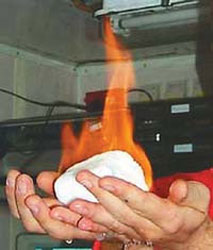| Home / China / National News | Tools: Save | Print | E-mail | Most Read |
| Breakthrough on New Energy Source |
| Adjust font size: |
Zhang Hongtao, deputy director-general of China Geological Survey (CGS), said gas hydrate samples were successfully collected from the northern part of the South China Sea last month. China is the fourth country after the United States, Japan and India to make such a technological achievement. Zhang said the development was expected to ease the country's dependence on oil and coal. Initial estimates indicate the potential volume of gas hydrates around continental slopes in the area exceeds 100 million tons of oil equivalent, Zhang said. The samples were collected from two different stations in the Shenhu (Magic Fox) continental slope on May 1 and May 15, he said. Nicknamed "flammable ice", gas hydrates are crystalline solids, which occur when water molecules form a cage-like structure around smaller "guest molecules" of methane, ethane, carbon dioxide and other substances. Stable only at low temperatures and/or high pressures, gas hydrates are extremely fragile, and mainly exist either in the seafloor or below tundra at high latitudes. The resource has become a hotspot of international research in recent decades, as scientists believe gas hydrates are a perfect alternative fuel resource to oil and gas. Every cubic meter of gas hydrates could release 164 cubic meters of gas. Globally, the amount of organic carbon within all gas hydrate accumulations roughly doubles the volume of all known coal, oil and natural gas reserves, which will be used up in about 70 years, Zhang said. China's research into alternative energy sources is still in its initial stages, a spokesperson with the Ministry of Land and Resources (MLR) said. Since 1999, the ministry has spent 500 million yuan on gas hydrate research projects in the sea, including an unsuccessful joint attempt by Chinese and German geologists to recover gas hydrates in 2004, when thick carbonate crust produced from methane and water molecules smashed the detection equipment. On the international stage, the US and Japan have already spent US$1 billion and US$600 million dollars, respectively, on relevant research. While developing countries seek to begin utilizing the resource by 2015, Zhang said that even 2030 would be an optimistic guess for China. China has been importing oil since 1993 and is now the world's second-largest oil importer after the US. However, its proven oil reserves might last only 11 years if output volumes stabilize at the same level as in 2006 and no new reserves are found, the MLR said in March. (China Daily June 6, 2007) |
| Tools: Save | Print | E-mail | Most Read |
 |
| Related Stories |
